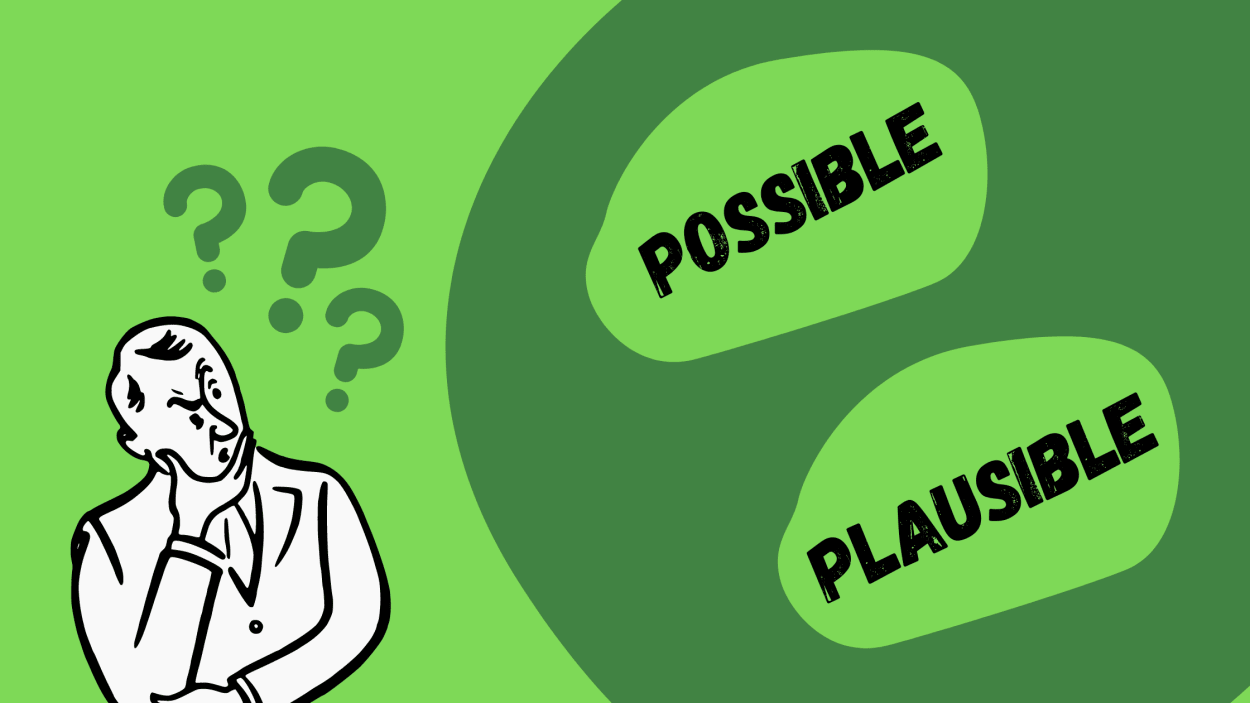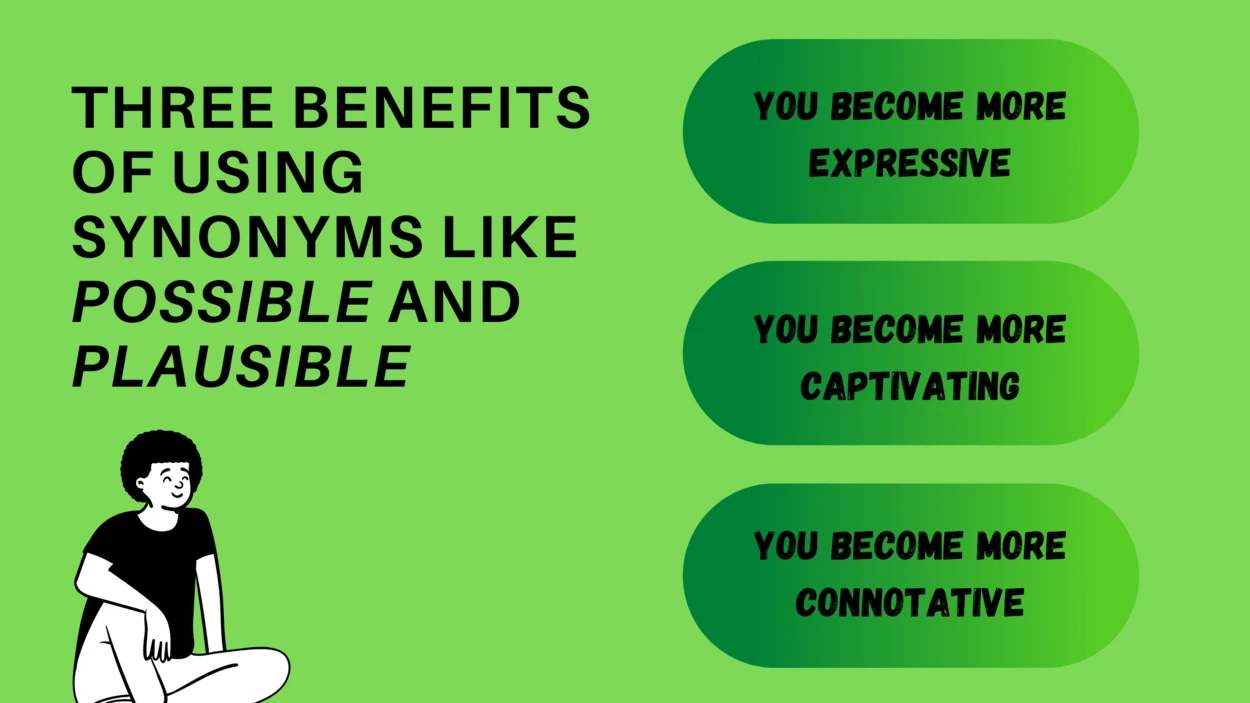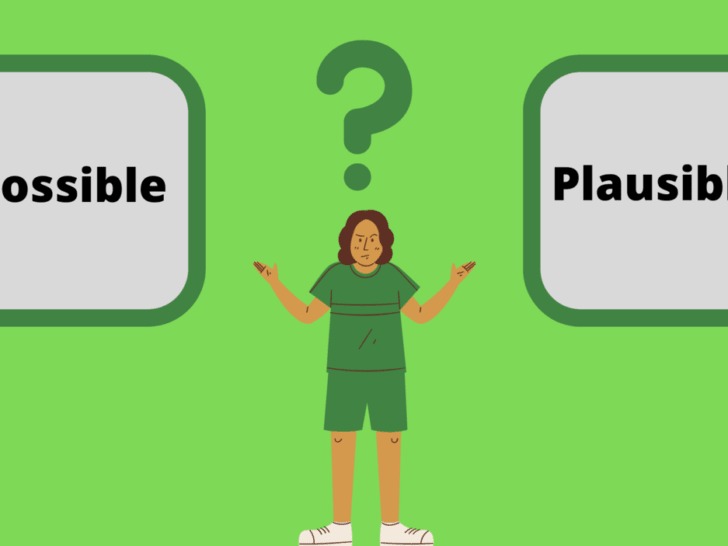David can beat Goliath, but is it plausible? If that confused you, I’m happy to say you’re in the right place.
Possible and plausible may be interchanged, but they have specific uses. We’ll explain their differences in this article, alongside tips on properly using other synonyms.
If you’re ready to gain knowledge, let’s begin!
What’s the Etymology of Possible and Plausible?
Possible’s etymology is defined as “that can be done.” Possible originates from the Latin word possibilis, while plausible came from plausibilis. On the other hand, plausible developed from a word that means “deserving of approval and applause.”
What’s the Difference between Possible and Plausible?
Both words are similar, but they have different uses. Cambridge Dictionary defines possible as being able to be done or achieved, while plausible connotes being reasonable or able to be believed.

When to Use Possible and Plausible?
Use both words to correspond to the concept they imply. If you want to give hope and say a particular event may happen, use “possible.” However, opt for “plausible” if you’re trying to say something is logical.
As a general rule of thumb, use possible for possibilities and use “plausible” for reasoning or explanations.
Use possible to define a certain extent or do something quickly. A few examples are “as soon as possible,” “as far as possible,” and “as much as possible.”
Be cautious when describing people as plausible. Although referred to as “reasonable,” it’s a word often used to hint at a person who appears honest but is not. An example would be, “He’s a plausible politician.”
Is Plausible a Synonym of Possible?
Plausible is a synonym for possible. However, use synonyms carefully. They’re essential as they improve communication with readers. However, improper use will lead to confusion.
Observe how a sentence sounds when you use possible and plausible in a correct and wrong way with this table:
| Correct Example | Wrong Example | Explanation |
| It’s possible to pass the exams when you cheat. | It’s plausible to pass the exams when you cheat. | You have a chance to pass the exams through cheating, among many other variables. |
| It’s possible to leave your job and start a business even though you’re struggling financially. | It’s plausible to quit your job and start a business even though you’re struggling financially. | A few people succeeded by leaving their job and starting a business despite being financially unstable. However, this isn’t likely to be accurate nor reasonable for most people as only a “few” succeeded. |
There are other benefits to using synonyms, but we’ll talk more about that later on, along with using synonyms properly.
More Examples of Using Possible and Plausible in a Sentence
According to Science Direct, examples motivate students to learn. So here are additional examples of sentences that use possible and plausible:
First Example
It's possible for Angelo to still be happy even though he lost the competition because he's mentally tough.
This sentence states that Angelo can still be happy even though he didn’t win since he’s mentally tough.
Using plausible here would imply that Angelo’s mental toughness is reasonable for being happy despite a loss.
Second Example
Is it possible for Chris to work even though he's sick?
This question asks if there’s a chance for Chris to continue working despite his sickness. Plausible may be a better word in this question to determine how Chris can work while not feeling well.
Third Example
Richard's business plan is plausible.
Both possible and plausible are suitable for this sentence, but plausible is a better term to use.
If you use possible, the sentence communicates that Richard’s business plan is possible, but why is there a possibility? It’s vague.
On the other hand, choosing plausible indicates Richard’s business plan as reasonable. It implies why a business plan can become a reality.
Fourth Example
He gave a plausible excuse on why he went to class late.
Saying he gave a possible excuse sounds like a guess, and it doesn’t make sense in this sentence. The word plausible shows he had an acceptable reason to justify why he didn’t go to class on time.
Other Synonyms of Possible
- Feasible
- Viable
- Achievable
- Within Reach
- Manageable
- Doable
Antonyms of Possible
- Unrealistic
- Infeasible
- Implausible
- Far-Fetched
- Unlikely
- Improbable
How to Use Synonyms like Possible and Plausible Properly?
Check the meaning behind a synonym before using it. Ask yourself, “Do I want to say that there’s a chance he’ll win? Or would it better to hint that his skills increase his chances of winning?”
Make it a habit to ask a similar question for every synonym you use. Once you establish this habit, you become a better writer.
To emphasize this concept, observe the two sentences:
| Sentence | Word | Definition | Explanation |
| He’s already 30 years old, yet he still views life in a youthful way. | Youthful | To be young and vigorous | It has an excellent implication to the 30-year-old man. |
| He’s already 30 years old, yet he’s still childish. | Childish | To misbehave or act immature | It connotes the idea that he’s already an adult yet doesn’t live like one. |

Three Benefits of Using Synonyms like Possible and Plausible
1. You become more expressive. Words are used according to their use, as stated a while ago. “You have a good face” doesn’t sound right when compared to “You have a beautiful face.” Emotions are vivid when you use synonyms rather than using the same word repeatedly.
2. You become more captivating. As you use impactful words, you catch the attention of readers. The best part about using synonyms is avoiding repetitive words. It prevents words from losing their value which explains why it captivates your readers.
3. You become more connotative — Guide readers to feel as they read a particular text. Synonyms give you the ability to make readers feel a specific emotion you want them to feel — look at the previous table again for reference.
Use a thesaurus to reap all of these benefits. They help you increase your vocabulary as they contain numerous synonyms. To explain more about thesaurus, here’s a video about four reasons you should use them:
Final Thoughts
Choose possible when you want to say there’s a possibility, but choose plausible to refer to rationality. Both words are synonymous with each other. However, it’s a must to understand how to use similar words properly. Remember, they’re alike, not the same.
When you misuse a synonym, the whole idea of a sentence changes, you may want to imply something good. Yet, one replacement can make the sentence produce negative emotions from the readers — to replace youthful with childish is an epitome.
Be careful when you use plausible as it may change the intention of your sentence. Despite being defined as reasonable, plausible is also used to refer to someone who’s fraudulent. Possible, on the contrary, is often used as an addition in phrases. For example, you can say, “Go home as soon as possible,” to tell someone they need to go home immediately.
To conclude, synonyms like possible and plausible are beneficial in writing, yet confusion arises when synonyms are misused.

